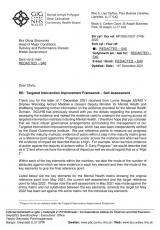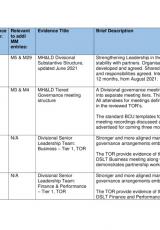Copïau o ohebiaeth oddi wrth Fwrdd Iechyd Prifysgol Betsi Cadwaladr ynglŷn â gwasanaethau iechyd meddwl.
Dogfennau

Dog 1 , Saesneg yn unig, math o ffeil: PDF, maint ffeil: 370 KB

Dog 2 , Saesneg yn unig, math o ffeil: PDF, maint ffeil: 394 KB

Dog 3 , Saesneg yn unig, math o ffeil: PDF, maint ffeil: 645 KB

Dog 4 , Saesneg yn unig, math o ffeil: PDF, maint ffeil: 1021 KB
Manylion
11 February 2022
Dear
ATISN 16026 – BCUHB Letter
Thank you for your request to the Welsh Government for information under the Freedom of Information Act (2000) received on 27 January 2021. You requested the following:
- A copy of Mark Polin’s (Chief Executive of BCUHB) response of 14/12/21 to Lynne Neagle’s (MS Deputy Minister for Mental Health and Wellbeing) Ministerial letter dated 07/12/21.
Our Response
Welsh Government holds this information and is attached at Document 1,2,3 and 4. Please note, some information has been redacted under Section 40 (2) of the FoI Act. A rationale for the use of this exemption is provided at Annex 1 to this letter.
Next Steps
If you are dissatisfied with the Welsh Government’s handling of your request, you can ask for an internal review within 40 working days of the date of this response. Requests for an internal review should be addressed to the Welsh Government’s Freedom of Information Officer at:
Information Rights Unit,
Welsh Government,
Cathays Park,
Cardiff,
CF10 3NQ
or Email: Freedom.ofinformation@gov.wales
Please remember to quote the ATISN reference number above.
You also have the right to complain to the Information Commissioner. The Information Commissioner can be contacted at:
Information Commissioner’s Office,
Wycliffe House,
Water Lane,
Wilmslow,
Cheshire,
SK9 5AF
However, please note that the Commissioner will not normally investigate a complaint until it has been through our own internal review process.
Yours sincerely,
Annex 1
Freedom of Information Act 2000: Section 40(2)
Section 40(2) together with the conditions in section 40(3)(a)(i) or 40(3)(b) provides an absolute exemption if disclosure of the personal data would breach any of the data protection principles.
‘Personal data’ is defined in sections 3(2) and (3) of the Data Protection Act 1998 (‘the DPA 2018’) and means any information relating to an identified or identifiable living individual. An identifiable living individual is one who can be identified, directly or indirectly, in particular by reference to an identifier such as a name, an identification number, location data, an online identifier or to one or more factors specific to the physical, physiological, genetic, mental, economic, cultural or social identity of the individual.
We have concluded that, in this instance, the information requested contains personal data.
Under Section 40(2) of the FOIA, personal data is exempt from release if disclosure would breach one of the data protection principles set out in Article 5 of the GDPR. We consider the principle being most relevant in this instance as being the first. This states that personal data must be:
“processed lawfully, fairly and in a transparent manner in relation to the data subject”
The lawful basis that is most relevant in relation to a request for information under the FOIA is Article 6(1)(f). This states:
“processing is necessary for the purposes of the legitimate interests pursued by the controller or by a third party except where such interests are overridden by the interests or fundamental rights and freedoms of the data subject which require protection of personal data, in particular where the data subject is a child”.
In considering the application of Article 6(1)(f) in the context of a request for information under FOIA it is necessary to consider the following three-part test:-
- The Legitimate interest test: Whether a legitimate interest is being pursued in the request for information;
- The Necessity test: Whether disclosure of the information/confirmation or denial that it is held is necessary to meet the legitimate interest in question;
- The Balancing test: Whether the above interests override the interests, fundamental rights and freedoms of the data subject.
Our consideration of these tests is set out below:
1. Legitimate interests
Your request indicates you are interested in obtaining copies of communications between Betsi Cadwaladr University Health Board and the Deputy Minister for Mental Health and Wellbeing. I do not believe that to satisfy this legitimate interest it is required to release the personal data of officials simply going about their day to day duties.
As such I do not believe there is a legitimate interest in the release of the personal data.
2. Is disclosure necessary?
Following the above analysis, we do not believe that disclosure of the personal data is necessary.
3. The balance between legitimate interests and the data subject’s interests or fundamental rights and freedoms
As we do not believe disclosure of this personal data is necessary, there is no requirement on us to undertake a test to balance the legitimate interests against the right of individuals, as the fundamental rights and freedoms provided by the DPA are not being challenged.
